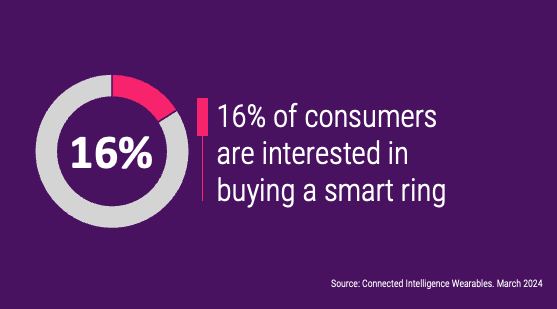
Samsung officially launches the Galaxy Ring
As expected, Samsung used its Unpacked event to officially launch the new Galaxy Ring. It is everything you would expect from a ring, with an accelerometer and a PPG sensor to measure blood flow and skin temperature. The device can track sleep and movement while you sleep, heart rate and so on. Interestingly, Samsung will give you an overall Energy Score to summarize how you should be feeling, as well as recommendations for how to improve your score. The Ring will set you back $400, which is $100 more than an Oura Ring. Having said that, Samsung is not charging a subscription fee so eventually, the Samsung variant will work out cheaper.
The Circana Take:
- Rings are certainly driving a lot of consumer interest and Samsung’s entry into this space is a good move as the company looks to solidify its place in the health and wellness space.
- The pricing feels a little high for a ring and it puts Samsung at the top end of the current market. Having said that, we expect to see bundled offerings of the Ring and Galaxy Watch, to provide a complete wellness solution.
- The Galaxy Ring has been designed to work most effectively within the Samsung ecosystem and there is clearly a hope here that interest in the Ring will help drive additional sales of Samsung’s phones (and watches) to complete the ecosystem. And no, there is no support for Apple iPhones.
- The smart ring market is already getting crowded with multiple lower-priced options available. As such, Samsung will have to work very hard to promote the benefits of a complete Samsung ecosystem to differentiate its product from other rings that are a fraction of the price.
Samsung launches Galaxy Watch 7 and Watch Ultra
Following on from Samsung’s launch of the Fan Edition watch a couple of weeks ago, the company has now unveiled the latest iteration of the Galaxy Watch (7), as well as launching a rugged version, called the Watch Ultra.
The Watch 7 comes with a 3nm processor, which Samsung claims can deliver three times faster CPU performance and – more importantly – 30% better power efficiency. The watch comes with dual-GPS to improve location accuracy, health tracking upgrades and the ability to control the device via double pinch gestures.
But the bigger news was the launch of the Galaxy Watch Ultra, which will compete more effectively against Garmin alternatives, as well as positioning Samsung more directly against Apple’s Watch Ultra. At $650, Samsung’s take on the Ultra device is cheaper than Apple, but we do not expect pricing to pull anyone away from the Apple ecosystem. Rather, the main play here is to strengthen Samsung’s position within the Android/Wear ecosystem and potentially pull customers away from Garmin.
The Circana Take:
- The Galaxy Watch 7 is a solid iterative improvement for Samsung that will help keep existing customers happy.
- The Ultra is the real news here. As we note, we do not expect this to pull consumers away from the Apple ecosystem, but it will significantly strengthen Samsung’s position in the Android/Wear ecosystem where there is a significant range of smartwatch options. Further, we do expect that this launch will increase pressure on Garmin, which historically enjoyed a strong niche in the more rugged, active sports arena.